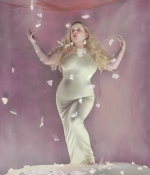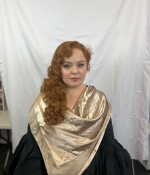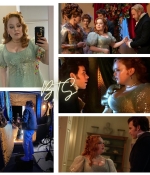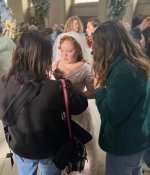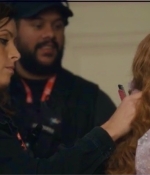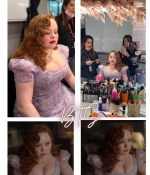 “They shot pheasants on the weekend … and I went to Nando’s!” Nicola Coughlan says, letting out a laugh. For those who aren’t familiar, Nando’s is a chain of medium-tier restaurants that specialize in peri-peri chicken, which is beloved in the United Kingdom. (Coughlan likes their halloumi fries.)
“They shot pheasants on the weekend … and I went to Nando’s!” Nicola Coughlan says, letting out a laugh. For those who aren’t familiar, Nando’s is a chain of medium-tier restaurants that specialize in peri-peri chicken, which is beloved in the United Kingdom. (Coughlan likes their halloumi fries.)
The Bridgerton star is telling me about the culture shock of moving to Oxford, England, to study drama in her mid-20s. It was very different from Galway, the harbor city on Ireland’s west coast where she grew up. In Ireland, she never really thought about class. Her dad was in the army and provided her family with a relatively normal life; her parents could afford to send her to ballet and acting lessons. In the South of England, however, signifiers of the British obsession with status (like weekend shooting trips) were impossible to escape. Her peers would hear her accent and assume she grew up in a shack somewhere, surviving on potatoes. “There were a lot of very well-to-do, upper-society people in my year, but they would never describe themselves like that,” she recalls. “Some of them would say they were ‘middle class,’ but they literally had connections to the royal family! It was really interesting.”
Observing the habits of England’s elite might have prepared Coughlan for her role in Bridgerton, Netflix’s fantasy period drama. She plays the devious yet well-meaning Penelope Featherington, the youngest daughter in a family who find themselves teetering on the edge of being priced out of high society—unless she or her sisters marry into wealth. The show was brought to our screens by TV legend Shonda Rhimes (Grey’s Anatomy, Scandal), and its first season was Netflix’s most-viewed original TV show ever at the time. And now, it’s back for Season 2.
It’s difficult to describe Coughlan, or her career so far, without resorting to clichés. It seems painfully 2013 to describe a famous actor as “relatable,” but that’s exactly what she is. Just like in a conversation with a good friend, our chat veers from political issues to reality TV stars. She’s just returned from New York, where she hatched an elaborate plan to meet her favorite Real Housewife, Sonja Morgan. “I love her so much,” she says. “My friend brought me to Cipriani, because we did research and apparently Sonja goes there on a Tuesday for lunch. But she wasn’t there!”
Coughlan is optimistic, but in a relaxed way that doesn’t feel forced or annoying. She talks extremely fast—likely a result of being Irish, a millennial, and clearly hyper intelligent. Upon learning that I am 29, the same age she was when she was cast in her breakout TV role, she immediately reassures me: “One thing I’ll say to you personally is that it’s about to get a lot easier and a lot better.” It’s a small moment that is typical of her warmth.
If you’ve seen her only in Bridgerton, it’s easy to assume Coughlan is an instant success story. Since the show dropped on Netflix, her rise has been meteoric. Kim Kardashian is a vocal fan; real-life royal Duchess Kate reportedly watches the show. Her follower count now stands at 1.6 million across Twitter and Instagram, where one of her posts can inspire a wave of news articles and spark social media discourse. Last year, she was even bestowed with one of pop culture’s highest honors: a guest judge spot on RuPaul’s Drag Race.
 But Coughlan’s kindness should not be mistaken for weakness, because her success follows a decade of setbacks. Five years ago, she was still working part-time in an optician’s office in her hometown. This period of her life was punctuated with moves from Galway to London in search of acting work, then back home again, which felt like a fresh defeat each time. “It’s hard to express how much I wasn’t working, or how little money I had in the bank,” she says, recalling years of emotional and financial precarity. “You couldn’t pay me to go back to my 20s. It was a massive struggle.”
But Coughlan’s kindness should not be mistaken for weakness, because her success follows a decade of setbacks. Five years ago, she was still working part-time in an optician’s office in her hometown. This period of her life was punctuated with moves from Galway to London in search of acting work, then back home again, which felt like a fresh defeat each time. “It’s hard to express how much I wasn’t working, or how little money I had in the bank,” she says, recalling years of emotional and financial precarity. “You couldn’t pay me to go back to my 20s. It was a massive struggle.”
Unlike her pheasant-shooting peers, Coughlan had to work to support herself when she left the “bubble” of drama school. She quickly realized it was near impossible to attend auditions while working full time to afford rent in London, where most auditions were. “I remember thinking, ‘Why am I here? I’m here to do acting, but I can’t even do the auditions,’” she says. “I’d hear stories about people who landed big Hollywood roles because their uncle knew a famous producer or whatever, and I definitely got super resentful.”
Coughlan has spoken before about the depression she experienced during this time. Having known she wanted to be an actor since she was four, the pressure to become a success early in life was overwhelming. At times, the dream seemed to be slipping away. Her big break finally came when she responded to a casting call on Twitter and landed a lead role in Jess and Joe Forever, a play at London’s Orange Tree Theatre. After that, in 2017, she was cast as Clare (an “anxious wee lesbian”) in Derry Girls, a teen sitcom set in a Catholic girls school in Northern Ireland during a time of national unrest.
Derry Girls changed everything. Not only did it become an instant cultural phenomenon in the U.K. and Ireland, but it was also a surprise hit when it was added to Netflix in the United States. Fans on both sides of the Atlantic are now awaiting the third and final season, expected later this year. Looking back, how did she keep her dream alive? “I couldn’t have kept going if I didn’t have such an insane love for acting. I knew it was worth fighting for,” she says, before her perceptiveness compels her to add, “I know that might sound very trite, but that’s just the truth.”
I wonder if Coughlan feels glad to have experienced Derry Girls–level fame before Bridgerton took things to a whole new level. She remembers sitting down with her costar Phoebe Dynevor before Bridgerton came out and preparing for life to change. “I just had a feeling it was going to take off,” she says. “I think I’d lulled myself into a false sense of security, because Derry Girls was such a hit and the five of us became instantly recognized in Ireland, which was quite weird. But three million people watched Derry Girls and 82 million watched Bridgerton, so it’s a different beast altogether.” Now, she is recognized everywhere she goes.
As Bridgerton returns for its second season, there are parallels between Coughlan, who is now 35, and young Penelope Featherington. (If you want to avoid Season 1 spoilers, I’d stop reading now). At the end of the first season, Penelope was unmasked as Lady Whistledown, a ye olde Gossip Girl–style columnist who operates under a pseudonym. Her scandalous letters, which are narrated by Julie Andrews, reveal the secrets of the elite players in Bridgerton’s fictional Regency London, infuriating and enthralling them in equal measure.
In Lady Whistledown’s second social season, the politics of the Bridgerton world are evolving. Young and wealthy women are still oppressed by men, of course, but they are portrayed as part of the ruling class too. While navigating these two truths, Penelope is deciding how best to wield the power that comes with the platform. What, if any, political messages does she want Lady Whistledown to represent? Are her letters just gossip, or gossip with a purpose?
I just had a feeling [Bridgerton] was going to take off.
When it comes to social media, where millions of followers watch everything she posts, Coughlan has asked herself similar questions. She considers herself a political person, having spoken out on issues like abortion in Northern Ireland, which was decriminalized in just 2019. In 2018, she wrote an op-ed for The Guardian, calling out unfair scrutiny of women’s bodies in theater reviews. Her feminism is grounded in a vocal allyship of trans and nonbinary people too. But in a world where she could easily spend every minute of the day tweeting about a different injustice, how does she decide which issues to speak out on?
“It’s really difficult,” she concedes. “I used to try and speak out on everything, because there’s so much to be angry about. But I’ve realized that trying to have a dog in every fight is probably not going to be as helpful as I want it to be.” A few days ago, for example, she found herself asking whether her opinion on Russia’s invasion of Ukraine was important, to which she concluded: no. “Ultimately, my opinion is not important, but I have a platform in which I can share resources,” she says. “So if there’s 1.3 million people on Instagram that can then get a link to the Red Cross, then I still think that’s useful.”
 Celebrities are often asked about haters and trolls in interviews, or even the dreaded “cancel culture” debate. As a woman who spends a lot of time online, Coughlan has plenty of experience of people picking apart how she looks and patronizing her. But I’m more interested in the other side: What’s it like suddenly having thousands of die-hard fans, who will back you up no matter what? She laughs when I predict I would probably become a power-mad dictator, drunk on social media cachet. “You definitely see that!” she says. “I don’t search for myself on Twitter. I don’t seek out people’s opinions of me. If you’re doing that, you’re gonna get into a world of trouble. I know friends who are way more known than me who do that, and I’m like, ‘Stop!’”
Celebrities are often asked about haters and trolls in interviews, or even the dreaded “cancel culture” debate. As a woman who spends a lot of time online, Coughlan has plenty of experience of people picking apart how she looks and patronizing her. But I’m more interested in the other side: What’s it like suddenly having thousands of die-hard fans, who will back you up no matter what? She laughs when I predict I would probably become a power-mad dictator, drunk on social media cachet. “You definitely see that!” she says. “I don’t search for myself on Twitter. I don’t seek out people’s opinions of me. If you’re doing that, you’re gonna get into a world of trouble. I know friends who are way more known than me who do that, and I’m like, ‘Stop!’”
Has she come to terms with the fact that she will always be narrativized in some way, even on a direct communication tool like social media? In this interview, she’s trusting me—a person she’s never met—to editorialize her. “I think you have to accept that and not be as frustrated by it as I have been in the past,” she says. “Social media is not real life! When I come home, my mam has a list of jobs for me to do in the house, and I babysit my niece and nephews. That’s real life, and that will never change.”
When Coughlan returns home to Ireland, it both grounds and motivates her. Bridgerton has been confirmed to return for another two seasons, but she still has the fear that the success she’s built could all disappear. “I really don’t think you should ever lose that [fear], because it keeps you appreciative of what you’re doing,” she says. After Derry Girls Season 2 wrapped, she remembers a string of unsuccessful auditions that brought her screeching back to earth. “When you face a stream of rejection, the voice in the back of your head starts to think, ‘Oh, I’ve had one lucky thing, but that’s it now.’ Then it also says, ‘Wow, I’m so lucky to have even had that one amazing thing,’” she explains. “You look at people who are in huge shows, then you hear nothing from them. It reminds you that nothing is guaranteed.”
As she drops another painfully true platitude, I wonder why Coughlan never sounds cliché. Some celebrities sound like they’re regurgitating How to Acknowledge Your Privilege infographics their reps saw on Instagram. But her self-awareness, which might be the result of having “made it” a little later in life, allows her to articulate the highs and lows of the dreamlike ride she’s on without seeming removed from reality. She doesn’t get defensive when I ask about more thorny topics, either, like why—in a fantasy period drama where racial diversity isn’t taboo and a Black monarch reigns supreme—Bridgerton lacks queer storylines. She doesn’t disagree. “I would love it. I think the rest of the cast would too,” she says of potential LGBTQ+ romances. “It’s definitely a show that is breaking down a lot of boundaries. I think that’s the next one that we all want to go towards.”
I don’t seek out people’s opinions of me. If you’re doing that, you’re gonna get into a world of trouble.
It is easy to forget that Bridgerton did initially receive online backlash for how diverse it was. A vocal minority even tried to downvote the show on IMDb because of it. Now, in the second season, the show’s racial diversity feels almost unremarkable, proving Shonda Rhimes’s ability to turn exceptions into norms. Rhimes has a history of introducing queer characters, so it’s hard to believe they won’t feature in Bridgerton soon. “What’s quite good, in a way, is that we’ve sort of established that it’s a fantasy world, so now we can sort of play with it. And I feel like that’s definitely something that can be explored really excitingly,” Coughlan says. “It’s going to get to a point where it’s Penelope’s ‘season,’ and it’s a discussion I definitely want to have, because that [LGBTQ+] representation is so, so important.”
As we end our conversation, Coughlan tells me she’s soon departing for Paris, a place she’s never been. I ask if she expects to be mobbed by strangers while she’s there. “I’ve got a face that says, ‘Please come sit beside me on public transport!’ I just give off that energy,” she says. “I do get approached an awful lot, but people are so lovely.”
This optimism, combined with a quietly unshakable determination, defines Coughlan’s story so far. What comes next? She has a long list of aspirations: A24, the entertainment company behind films like Lady Bird, Moonlight, and HBO’s Euphoria, is high on her list of dream collaborators. She wants to do Saturday Night Live with Amy Poehler and Tina Fey, and work with Daniel Kaluuya and Judi Dench too. “I’d love to do a prestige drama, playing someone absolutely terrible, something really, really dark,” she says, her tempo accelerating with excitement at the thought. “I’ve barely scratched the surface of things that I want to do.”
Harper’s Bazaar
Written by Louis Staples
Published March 24, 2022

